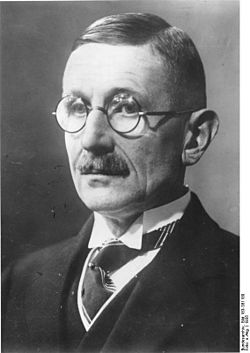Hans Grimm

Hans Grimm (22 March 1875 – 29 September 1959) was a German writer.[1] The title of his 1926 novel Volk ohne Raum became a political slogan of the expansionist Nazi Lebensraum concept.
Early life
Hans Grimm was born in
Shy and reclusive as a child, Hans Grimm showed an interest and aptitude for writing and in 1894 started to study Literature and French at the
Works
Grimm's
From a strictly literary point of view — and leaving their ideological bias to one side — the most readable of Grimm's works are, however, his Novellen and short stories, in which the discipline imposed by restricted space forces him to abandon the discursive wordiness of Volk ohne Raum (1344 pages in the one-volume edition).
Nazism
Grimm had been a sympathizer of the
In a centenary address (Der verkannte Hans Grimm, Lippoldsberg 1975), designed to restore Grimm’s reputation, Klaus von Delft was able to cite letters of complaint from Grimm to the Nazi authorities on a number of subjects: the infringement of the right of confidentiality at the ballot box; the behaviour of the Hitler-Jugend and the Nazi student association; the coupling of foreign and domestic policy issues in the 1936 referendum on Hitler's rule; and criticism of Hitler’s presentation of the murders of the "Night of the Long Knives" in 1934 as due judicial process. It is, however, indicative of Grimm's stance that von Delft is not able to find or cite any criticism of National Socialist racial policy. In 1938 Grimm was threatened with imprisonment by Propaganda Minister Joseph Goebbels and withdrew from public life.
Despite everything, however, even after 1945 Grimm remained true to his political convictions. In a pamphlet Die Erzbischofsschrift. Antwort eines Deutschen, (1950), a response to a message from the Archbishop of Canterbury to the German people, Grimm described Germany's war of aggression as an attempt to defend "European Culture" against Communism and blames Great Britain for escalating a local conflict into a global war. He even justified the Holocaust on the basis of a warped reading of Deuteronomy 20:13, 16; the publication met with a storm of criticism in Germany and abroad.[4] In 1954, having failed to gain a seat in the West German parliament for the extreme right-wing "Deutsche Reichspartei", he published a detailed defence of National Socialism under the title Warum, woher aber wohin? (Why, whence, but whither?).
Later life
In the late 1930s, Grimm lived in Lippoldsberg restoring a number of monastic buildings that were left over from World War I. Consolidating his interest in real estate after World War II, he finished buying the monasteries, which were essentially fixer-uppers. Nevertheless, he was far from being overwhelmed with repairing these monasteries. He actually found enough time after 1949 to devote to his numerous literary activities, publishing his Lippoldsberger Dichtertage (Lippoldsberg Writers' Congresses).
He died in 1959 in Lippoldsberg.
Selected works
Fiction:
- Südafrikanische Novellen, 1913
- Der Gang durch den Sand, 1916
- Die Olewagen-Saga, 1918
- Der Richter in der Karu und andere Novellen, 1926
- Volk ohne Raum, 1926
- Die dreizehn Briefe aus Deutsch Südwestafrika, 1928
- Das deutsche Südwester-Buch, 1929
- Was wir suchen ist alles. Drei Novellen, 1932
- Der Ölsucher von Duala. Ein afrikanisches Tagebuch. 1933
- Lüderitzland. Sieben Begebenheiten, 1934
published posthumously:
- Kaffernland. Eine deutsche Sage, 1961 (written 1911-15)
- Heynade und England, 1969/70 (written 1937-45)
Non-fiction:
- Englische Rede : wie ich den Engländer sehe [The Englishman as I see him], 1938 (published in English and German)
- Die Erzbischofsschrift. Antwort eines Deutschen, 1950 (published in English translation by Lyton Hudson as Answer of a German: an open letter to the Archbishop of Canterbury, 1952
- Warum, woher aber wohin? 1954
References
- ISBN 978-3-11-022245-6. Retrieved 13 September 2013.
- ISBN 978-1-136-41381-0. Retrieved 13 September 2013.
- ISBN 978-3-10-039326-5, p. 198.
- .
